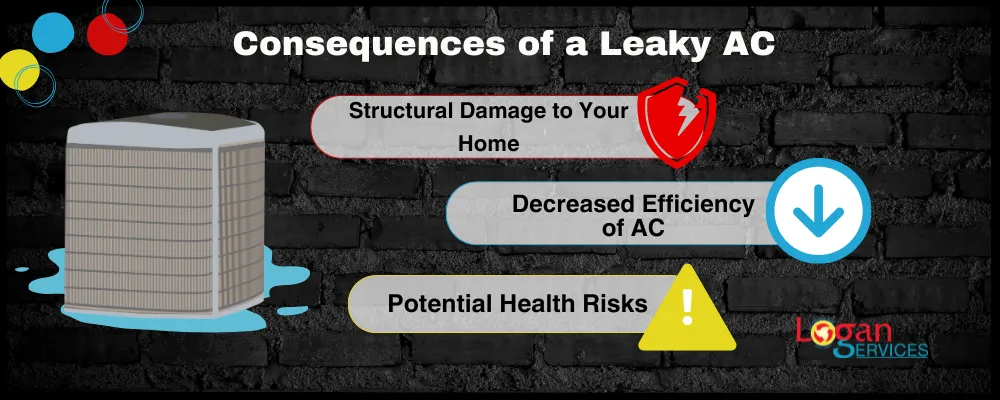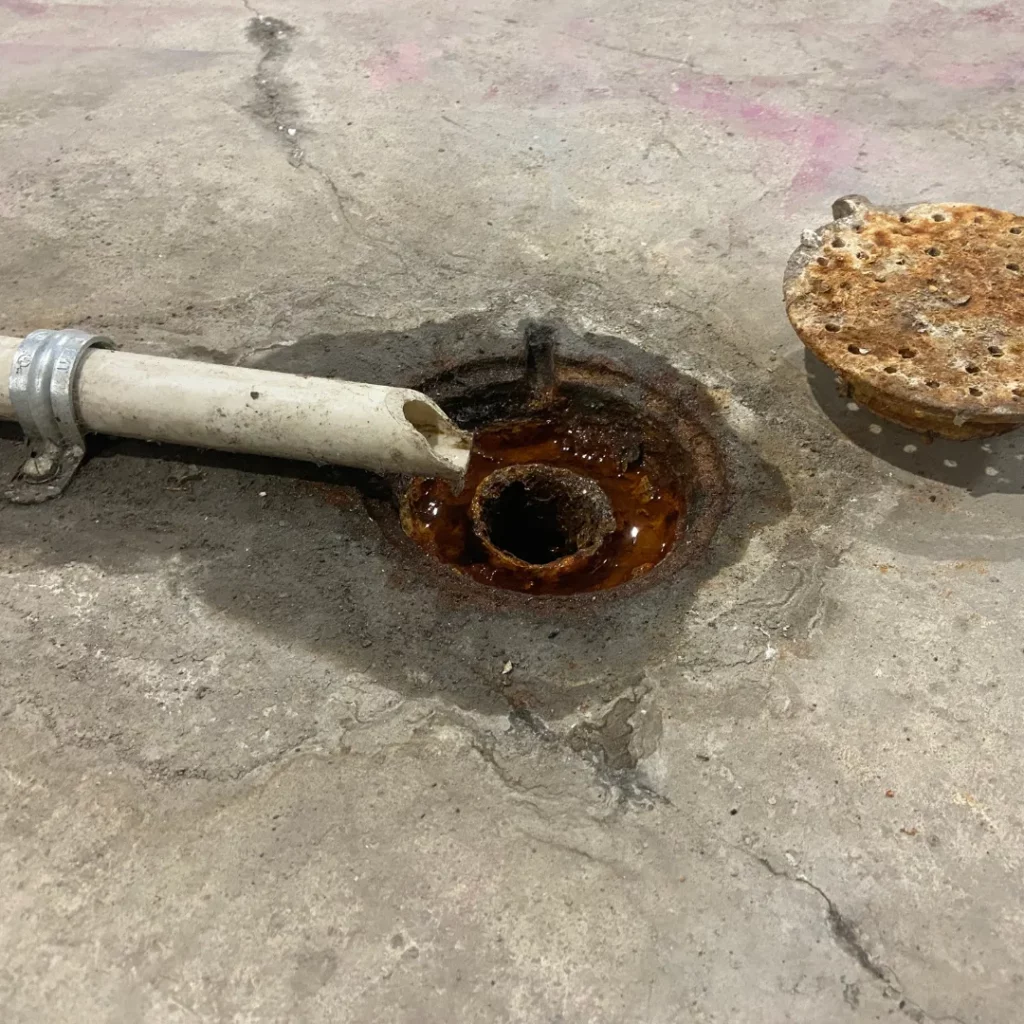Is your air conditioner suddenly leaking water? If yes, then it may be a matter of concern. Not only can it damage your property, but it can also pose a health risk. In this article, we will cover various causes of AC water leakage, its consequences, and the steps to prevent it from happening.
Causes of AC Leaking
Several factors can lead to your air conditioning unit exhibiting symptoms of what seems like a mild annoyance but can escalate into a major issue – AC leaking. Analogous to many appliances, your AC unit may leak water due to aging, improper maintenance, or faulty components.
Clogged Drain Line
One common cause of AC leaking is a clogged condensate drain line. Over time, mold, dust, and other debris can accumulate in the drain line, causing obstructions that prevent condensation from draining as it should. As water builds up, it may eventually cause the air conditioner to leak.
Cracked Overflow Pan
Another frequent offender is the primary drain pan. It can crack or rust over time, allowing water to seep out and cause an air conditioner leak. A cracked overflow pan can easily lead to dampness and mold in the humid climate of Northern California or any other similar region.
Dirty Air Filter
A dirty air filter is another potential reason for air conditioner leaks. Over time, air filters accumulate dust, mold, and other contaminants, limiting airflow over the evaporator coils. This causes ice to form on the coils, and when it melts, the condensation can overwhelm the drain pan, leading to water leaks. To avoid a dirty air filter problem, routine filter maintenance or using a smart thermostat to monitor your air conditioner’s performance can be helpful.
Consequences of a Leaky AC
What happens if you ignore a leaky air conditioner? The consequences could be dire, affecting not just the performance of your air conditioning unit but also your health and the structural integrity of your home.
Structural Damage to Your Home
AC leaking, if ignored, can cause significant damage to your home’s structure. A slow, persistent leak can seep into the foundations of your home, causing the wood to weaken over time. Once a problem like this begins, it can quickly spiral out of control, leading to expensive structural repairs.
Decreased Efficiency of Air Conditioner
One consequence you will quickly notice is decreased efficiency in your air conditioner. When components like the evaporator coil or air filters are not working properly, the unit has to work harder to cool the air. This inefficiency can lead to higher power consumption and, by extension, steeper utility bills. .
Potential Health Risks
Besides structural damage and increased power bills, a leaky air conditioning unit can cause potential health risks. Standing water is a breeding ground for mould and insects, which can lead to respiratory issues and other health complications. Therefore, it is paramount to address the source of the AC leak as soon as possible.

Steps to Prevent and Handle AC Leaking
The issue of an AC unit leaking water is quite common for most homeowners, especially during the hot season in Northern California when your air conditioning unit is working overtime. However, there are several measures that you can take to prevent and handle air conditioner leaking water.
Regular AC Maintenance
One of the main reasons that an air conditioner leaks water is due to a lack of regular maintenance. Replacing or cleaning your air filter monthly can go a long way to prevent your air conditioning unit from leaking. A dirty air filter can block airflow over the evaporator coils, causing them to freeze and later leak water.
Another way to prevent an air conditioner leak is to regularly inspect the condensate drain line. This component of your AC unit helps remove condensate formed during the cooling process. If it gets clogged, it can cause your air conditioner to leak water. Therefore, it’s essential to clean it from time to time.
Immediate Action for a Leaking AC
If your AC is already leaking water, there are some immediate steps you can take. First, turn off your air conditioner to prevent further water damage. Then, check the air filter. If it’s dirty, replace it. This may solve your issue, but if it doesn’t, inspect the evaporator coil for ice because ice can lead to an air conditioner leaking water. If you see any ice, turn the air conditioning unit to the fan only to help melt it.
Seeking Professional Help
If you’ve followed the steps above, and your AC still leaks water, it’s time to call a professional. A professional will inspect components like the primary drain pan and the pan switch to see if they’re correctly installed and functioning. They’ll also inspect the air ducts and other parts of your air conditioning unit, ensuring that they’re clean and in good condition.
FAQs
How do you fix a leaking air conditioner?
Fixing a leaking air conditioner will depend on the cause of the leak. Here are some possible solutions:
1. Check the condensate drain line: A common cause of leaks is a clogged or disconnected condensate drain line. Locate the drain line and check for any blockages. Clean the line with a mixture of bleach and water or use a pipe cleaner. Ensure the line is properly connected and free of any obstructions.
2. Replace the condensate drain pan: If the drain pan is cracked or damaged, it may need to be replaced. Carefully remove the old pan and install a new one following the manufacturer’s instructions.
3. Clean the air filter: A dirty or clogged air filter can cause the evaporator coil to freeze, leading to excess condensation and leaks. Remove the filter and clean or replace it as needed. Regularly cleaning or replacing the air filter can help prevent future leaks.
4. Check the refrigerant levels: Low refrigerant levels can cause the evaporator coil to freeze, resulting in leaks. Contact a professional HVAC technician to inspect and recharge the refrigerant if necessary.
5. Inspect the drain pipe fittings: Over time, the drain pipe fittings can become loose, causing leaks. Inspect the fittings and tighten or replace them as needed.
6. Clean the evaporator coil: Dust and debris can accumulate on the evaporator coil, hindering proper drainage and causing leaks. Carefully clean the coil using a soft brush or a vacuum cleaner with a brush attachment.
Take precautions to avoid bending or damaging the coil. If these steps do not resolve the leaking issue, or if you are unsure about performing the maintenance yourself, it is recommended to contact a professional HVAC technician for assistance.
Should I turn off my AC if its leaking?
If your AC unit is leaking, it is generally recommended to turn it off and address the issue promptly. Continuing to operate a leaking AC can lead to further damage and potentially result in more expensive repairs. It is important to identify the source of the leak and determine whether it is internal or external. Internal leaks, such as a blocked or damaged drain line, can lead to water damage, mold growth, and other issues. On the other hand, an external leak may be caused by refrigerant leakage, which requires professional attention to fix. In either case, turning off the AC and contacting a professional HVAC technician is advisable to assess and resolve the problem.
Why is my AC leaking water from the bottom?
If your air conditioner is leaking water from the bottom, there could be a few potential causes. One possibility is that the condensate drain line is clogged or blocked. The condensate drain line is responsible for carrying away the moisture that is collected during the cooling process. Over time, it can become clogged with dirt, dust, or debris, causing the water to back up and leak out of the unit. Cleaning or unclogging the drain line may resolve the issue. Another common cause of water leakage is a frozen evaporator coil. This can occur due to restricted airflow, low refrigerant levels, or a malfunctioning blower motor. When the evaporator coil freezes, it can cause the condensate to build up and overflow, resulting in water leakage.
If you suspect a frozen coil, it is recommended to turn off the AC and allow it to thaw completely before restarting. Additionally, a faulty condensate pan or drain pan can also lead to water leakage. Over time, these pans can crack or become damaged, causing water to leak out. If this is the case, the pan may need to be replaced to resolve the issue. If you are unsure about the cause of the water leakage or are unable to resolve it on your own, it is recommended to contact a professional HVAC technician. They will be able to diagnose the problem accurately and provide the necessary repairs to prevent further water leakage.




















